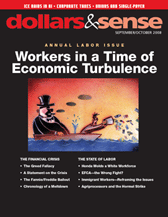Confidence Trick
This article is from the September/October 2008 issue of Dollars & Sense: The Magazine of Economic Justice available at http://www.dollarsandsense.org

This article is from the September/October 2008 issue of Dollars & Sense magazine.
Subscribe Now
at a 30% discount.
Hyman Minsky, the theorist of financial fragility whose work has enjoyed a revival as U.S. financial institutions crumble, always maintained that “there is nothing wrong with macroeconomics that another depression wouldn’t cure.”
Whatever salutary effects today’s financial crisis, undoubtedly the worst since the Great Depression, might be having on macroeconomics, it has yet to improve economic policymaking. The Bush administration exploited a financial panic, vastly exaggerating its dangers for the broader economy, to extort $700 billion from a Congress only too willing to open taxpayer’s wallets to bail out those who benefited from the speculative excesses of an $8 trillion housing bubble.
Whatever this massive public purchase of bad debt will do to patch up the credit system, the bailout will not counteract the downward spiral in housing prices that brought on the credit crisis and will undoubtedly continue. The bailout will do little to make bad mortgage debt more viable or to provide relief to homeowners behind in their mortgage payments or facing foreclosure. Nor does the bailout place effective limits on CEOs’ pay or their golden parachutes, erect the regulatory safeguards that will curb future financial excesses, or counteract the worsening recession. Worse yet, the bailout swells the federal budget deficit and for that reason will likely sap whatever political will could have been mustered to make the massive public investments necessary to prevent the economy from falling into a prolonged depression.
For the policy maestros to do better than this disgraceful, already-failed, confidence trick of a bailout package that entirely ignores the elephant in the room (as economists Nouriel Roubini, Paul Krugman, Joseph Stiglitz, and Glen Hubbard have described it), the crisis will have to put an end to the illusion of self-regulating markets, much as Minsky envisioned a depression might.
But neoliberal prestidigitation continues. Even as the Wall Street Journal reports that the financial system has been “shaken to the core,” its editors steadfastly maintain that the “sins of deregulation” are “a political fairy tale” in an attempt to absolve the market from blame for the crisis. The government-sponsored enterprises Fannie Mae and Freddie Mac, complain the editors, “turbo-charged the credit mania” by subsidizing rates of return for mortgage-backed securities and increasing the number of mortgages available to risky low-income borrowers. (For an accurate portrayal of Fannie’s and Freddie’s role in the crisis, see page Fred Moseley’s article in the current issue.)
The Journal editors’ latest free-market sleight of hand notwithstanding, unregulated and deregulated financial markets combined with new, harder-to-regulate financial instruments and ever-present greed to unleash today’s pernicious economic instability. As the economy teeters, we must challenge the antidemocratic dictates of an inflation-phobic Wall Street to demand that government effectively regulate the entire range of financial institutions through strict capital requirements and a tax on speculative turnover intended to encourage long-term productive investment. We must build institutions of regulatory enforcement that will remain strong when the next bubble comes and its beneficiaries pour buckets of money into the political system to move their deregulatory agenda forward. Likewise, massive public spending is needed to put the nearly one million people who will have lost their jobs this year back to work and to jump-start the economy. Public policy must also be dedicated to spreading the benefits of renewed economic growth widely through progressive taxes and by putting the interests of people before the profits of those who have recklessly polluted the economy with toxic debt.
Without those measures, Wall Street will continue to be, as Woody Guthrie put it in the midst of the Great Depression, the street that keeps the rest of us off Easy Street.

